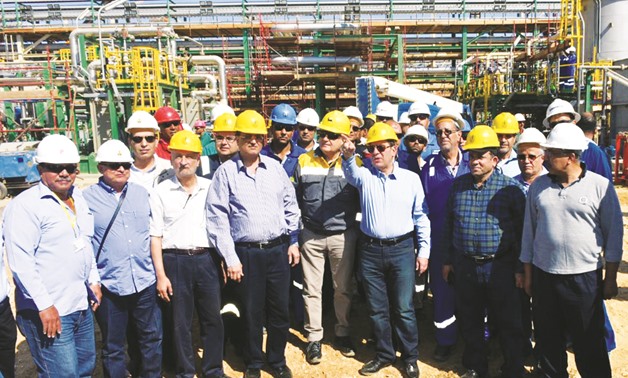
Minister of Petroleum Tarek El-Molla visiting Zohr field- Press Photo
Expected to prove a shot in the arm for the Egyptian economy, the giant offshore gas field Zohr could well put Egypt back on the map of net gas exporters, with a capacity of up to 30 trillion cubic feet of gas.
Located in the Shorouk concession on the Mediterranean, Zohr will significantly boost Egypt’s natural gas production, which currently stands at 5.1 billion cubic feet of gas per day. It will also secure the energy needs of a country that consumes around 6 billion cubic feet of gas a day, with 65% of them going to the electricity sector.
The optimistic project was announced in August 2015 and the first phase has already been completed with the drilling of six wells that are expected to commence production this month. The second phase involves drilling more wells and offshore gas facilities.
The field has an area of 100 square meters and a depth of 1,450 meters. Investing around $10 billion in the project; Eni is anticipating the field will produce 2.7 billion cubic feet per day by 2019.
Trial operations of Zohr are reported to have started, and the first output is expected this month at 350,000 cubic feet per day. By June 2018, an additional 700,000 cubic feet per day will be added to Zohr’s production, Minister of Petroleum Tarek El-Molla had said in November.
After Eni sold stakes in the concession to Rosneft and BP in 2017, the field’s stakeholders are now Eni (60%), Rosneft (30%) and BP (10%).
Export potential
When the Zohr field was discovered, Egypt was suffering from a severe energy shortage, which resulted in decreasing the production capacity of some factories and nationwide power cuts. But 15 exploration areas on the Mediterranean were up for tender in 2012. Right after monitoring operations showed that a reservoir was concealed in Block 9, Eni entered the bid and subsequently the project.
Five years later, the situation looks very different for Egypt, which is now expected to become a net exporter of gas as early as 2019 with Zohr’s output.
Eni will export from Zohr through a liquefied natural gas (LNG) plant in Damietta, which after being stalled for over five years will resume operations in 2018. Zohr production will help the country offset burdens on its foreign currency as the government is planning to stop importing LNG. “Egypt will have to buy output from the shares of other stakeholders in the field to meet local demands, and to stop importing LNG,” Molla noted.
In 2017 alone, Egypt signed contracts to import between 100 and 108 LNG shipments, including 43 to 45 cargoes in government-togovernment contracts from Oman, Russia’s Rosneft PJSC and France’s Engie SA.
“We will become an exporting country; however, this is not what we hope for. What we want to develop through the gas surplus are value-added industries such as the petrochemical products and transformation sectors,” Molla told Eni’s publication About Oil in November.
The players
While Eni is considered the main project developer, owning 60% stakes, Russia’s top oil producer Rosneft entered the scene in October after it closed the transaction to acquire a 30% stake in the concessions agreement for the field. The cost of the Rosneft stake acquisition is $1.125 billion, in addition to refunding its share in past project costs to Eni. This came after
Rosneft’s board approved the purchase of a 30% stake in the concession and the purchase of a 15% stake in the joint venture established by Eni’s IEOC Production B.V. and Egyptian Natural Gas Holding Company (EGAS), which is the operator of the project at the development stage.
In a presentation last October, Rosneft said it is planning to spend $2 billion on the Zohr field from 2018-21. The Russian company seemed satisfied with its participation as Rosneft CEO Igor Sechin said at a conference in September that his company is “pleased” with its Zohr buy-in and may increase its stake in the field to 35%.
Work on the Zohr field has not been stalled. Each month, a new contractor and a service provider company is announced to have sealed a deal to work on the project. In November alone two companies were awarded new Zohr contracts.
Maridive, which is listed on the Egyptian Stock Exchange, and Oil Services announced winning a $20 million deal to provide maritime and petroleum services for the field. The Italian firm Bonatti Group also said it received an electrical and instrumentation contract to supply cable and electric works to the project.
Many international and local companies are taking part in the efforts conducted in Zohr. The main contractors of the project are Petrojet and the Engineering for the Petroleum & Process Industries (ENPPI). Engineering, Procurement, Construction and Installation (EPCI) works of the project are conducted by Italian oil and gas industry contractor Saipem.
El-Molla called on participating companies to finish their work over the second half of 2017, leading many developers of the project to repeatedly remark that Zohr works are proceeding ahead of schedule. President Abdel-Fatah al-Sisi has also issued directions to eliminate any obstacles standing in the way of developing the field.
Fruits of the field will appear gradually after launching production in December, with production to be doubled in two months to reach some 700 million cubic feet of gas per day, increasing to one billion cubic feet before the end of the first quarter of 2018.
Officials are confident that Zohr will enable Egypt to realize its ambition of becoming a regional center for energy trade and circulation reaping the benefits of its distinguished geographical location.

Comments
Leave a Comment